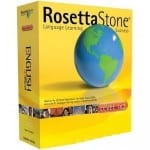 If you’ve ever wanted to learn a new language and have heard a promo for Rosetta Stone you’ve probably thought about trying it out and wondered if it works or not. Learning a language is easy for some, and can be very difficult for others, so there’s no real way to tell if it will work for you unless you give it a try for yourself and weigh the results.
If you’ve ever wanted to learn a new language and have heard a promo for Rosetta Stone you’ve probably thought about trying it out and wondered if it works or not. Learning a language is easy for some, and can be very difficult for others, so there’s no real way to tell if it will work for you unless you give it a try for yourself and weigh the results.
Overview
There are three major players in the world of language learning for the new era. There is Rosetta Stone, Pimsleur, and Rocket Languages. Both abandon more traditional methods of language learning in favor of newer methods that leave behind books and stick mostly to audio and visual stimulation.
The Claim
Rosetta Stone claims that you can carry on a conversation with a native speaker of a language by following their programs from beginner to advanced. They further claim that their software is award-winning and used by high-ranking people that need to know other languages in order to perform the job that they do.
The Hype
The hype starts off in their radio and television advertisements that show people stating that they were able to learn a new language by following the Rosetta Stone system. There is no way to tell if it’s a paid actor or a real user. If it is a real user this really means nothing, because finding one person that successfully used the system out of thousands of people that tried it should be no difficult feat.
The Cost
The cost of Rosetta Stone is a little off-putting, and almost makes it prohibitively expensive. Unless you’re really bent on learning the language and are fully invested in sitting and following all of the programs, it’s probably a good idea to save your money and get a book from the library.
The Commitment
Rosetta Stone may have some proprietary methods that make a language easier to learn, but you’ll still have to be the one that does the learning. No one can learn the language for you, and it’s not a subliminal program so you’ll have to give it some effort and put the time in.
Evaluation
By taking away the traditional methods of learning a language using rote memorization, Rosetta Stone takes a unique approach that makes it livelier and more high tech to learn and use a new language. Since there are many different ways that people learn, this new system will work for some, but others might find it better to learn by writing and reading, rather than with pictures and audio.
Does Rosetta Stone Really Work?
Rosetta Stone provides and engaging environment for language learning and if you’ve got a strong desire and a strong commitment to following it through all of its levels you’ll no doubt be able to converse with native speakers across the globe.
It is not an end all though, and should not be the only device you use in order to learn a language. Get a language partner, do a language exchange, visit the country where they speak that language as their first language. Only when used as a comprehensive approach will you get the results that you seek.
Our Recommendation
If you’ve got the extra cash to drop on it you should try it out and see if it works for you. If it blends with your style of learning it will probably have good results for you, but if you learn in a way that is not conducive to the program, you’ll have to keep trying different methods until you find a way that works.
Read user reviews on Rosetta Stone



I’m learning Dutch since I have a lot of Dutch ancestry and I’m a language teacher and I love learning languages myself and I’ve always been curious about RS! It may not work for everyone but it REALLY works for me – talk about communicative! and Stephen Krashen’s meaningful input and all the stuff I learned in my linguistics courses. Of course nothing beats going to the country and speaking with native speakers but I think that RS really does get you started with the speaking and listening, and has some reading without being totally reading based as so many language programs are (and as are the courses we took in high school and college…) Thumbs up from this end.
Man, this is expensive, but there is a reason.
It works.
The system is interactive, so you don’t just sit there being told stuff like they did at school (where I went, anyway), so you get as close to the experience of speaking a language in a culture as you are going to get without actually going there. Which is clearly the best way to learn a language. But unless you have no commitments elsewhere and can drop everything to go live in another country for a year or so, this is by far the best way t learn another language from your home. You can make up the schedule, but this also means you have to maintain the discipline. Sometimes having a class to get to makes you do something more than if you can do it whenever.
I’m just half way through the second Spanish course, but my thoughts of the Rosetta Stone program so far are exceptional. It helps to truly have a basic understanding of the vocabulary, but I believe actually a total beginner could browse it without a lot of trouble. Even though they do not have you make terminology lists, I myself find it useful to truly have a self-created one by my side, and in a different browser window. I also got a free online Spanish-English translator because every once and again I simply do not get what they need me to understand. I simply quickly enter the phrase, and I am set to proceed. The mic and earphones that come with the set appear sufficient for the program. My husband and I are happy to suggest Rosetta Stone.
My favorite method to learn languages is to travel and to immerse myself in the culture and the language. I find that within a week or two in a country it is usually possible to learn so much more than with books and programs. I learned a great deal of Spanish that way. The humain interaction is key and it is pretty hard to replace that. However Rosetta Stone seems like the closest substitute for someone who prefers computer programs.
It cost more than a the other programs but I read that it was possible to have video conference sessions which helps.
Having tried Rosetta Stone out myself I must say that I was highly disappointed by how such a low quality product would have such a high price. This only proves that just because something is expensive doesn’t mean it’s necessarily the best. I think the most offensive thing about was that it catered heavily to an American audience and used pictures from America. Especially reusing photos are a bit inappropriate for certain languages. Such as a photo of guy reading an Arabic newspaper for learning Russian or a Geisha for learning Spanish. Not to mention there are quite a bit of photos that were poorly photoshopped as well.
It claims to be an “immersion” program but it’s far from it. Learning phrases like: “The elephant is green” is not going to be useful in the long run. It’s basically like teaching you a visual phrasebook but you won’t actually learn any natural phrases and will sound like a foreigner anyway. I found LingQ to be more useful and it’s a lot cheaper than Rosetta Stone in the long run.
I had a hard time with the Rosetta Stone method – maybe some people just do better with the structure of a live classroom. My daughter is fluent in four languages and when she was home for Christmas the year I was learning Spanish, she was not impressed with the way the lessons were offered (especially in light of the price). I thought I was learning a great deal of a new language, but was really just reinforcing some bad habits that come with not having an instructor to interrupt at the time of the mistake. It surprised me since I’d always thought of myself as a ‘visual learner.’
I used Rosetta Stone for French, Farsi, and Chinese. Our local library used to have an online subscription, and you could use your library card number to access any of the languages. It was awesome. Apparently, Rosetta Stone felt they were losing too much money with this though, and they banned online subscriptions through libraries. Now, the only way to get it through the library is by checking out the physical copy. I tried to get the French one again, and I was like number 70 or something on the waiting list. I did love Rosetta’s methodology, though, so I’m considering possibly buying it in the future. It’s a great refresher, and hearing the language again and again helps to make the words come to your mind quicker in a real life setting.
Did it for Italian, my relatives came from Italy for a wedding and I wanted to be able to converse with them. I am not the best with learning by rote and I can say that Rosetta Stone is easy and fast.At the beginning it may seem a little awkward especially if you are used to writing stuff down and reading a book. This program takes a different approach and gets you conversing with the characters on the screen. A definite thumbs up for me.
funny, i wasn’t 18 when i had my first conversation in english. i just got rosetta stone to learn spanish. i’m still on level 1, but i already feel more knowledgeable about the language then i did after passing all of my spanish classes in highschool. i read the reviews and understand its not a complete language in a box. im just going to stick with it till i finish every level, and then go from there.
Awesome. This is everything you need to learn Spanish, Italian, or any other language in one super package. Forget about alternative. Go Rosetta and stop wasting time and money. Personally and many have recommended, including in this article that practicing with real partners or finding cool people to talk with is essential in ironing out the kinks with specific tones and words. Use RS to get goin’ and improve over time but make sure you practice a lot in between with anyone you can. Practice is the key to learning a new language. Learn to talk Mandarin isn’t the same as learning to cook breakfast. It’s a completely different ballgame. It starts with lessons, practice and more practice and challenging the mind in different ways until speaking in your new language becomes almost second nature. Rosetta Stone will definitely help and they’re always improving their service and have so much feedback and many users backing it up. Hope this helps.
18 Years to learn a language?
When Rosetta Stone radio ads tell me that I could learn another language “naturally” like I learned my native language, I laugh. It takes, typically eighteen (yes 18) years to master one’s language: conversational from Mom, grammar school, high school, etc. The radio ads are full of it!
Hey Chad, funnily enough I chose Rosetta to start learning Italian.
Highly recommended. I thought i’d go down the cheap route to start with and so went in search of other ways to learn, but with Rosetta you get all you need in the package and you just seem to keep motivated to use it and learn.
Get it dude. you won’t regret it!
1st time I even heard of Rosetta Stone was in a hip-hop mixtape. Not sure if it was the same Rosetta Stone but once I checked it out the whole language learning thing really got me hyped. 🙂
I give 2 thumbs up… give it a try. If you wanna learn something new or improve your skills or whateva this will help. I’m feelin’ it. 😉
Nice to see an unbiased article on the Rosetta Stone courses.
I’m looking to start learning Italian to help me out in work, and have been researching a little in to the best way to start.
After seeing the Rosetta stone ads on TV I was all geared up for going with those, but as you say,the cost is quite substantial.
I’m hoping I can find some apps for my IPhone that will help me get started… Otherwise I may well be stumping up the cash for a Rosetta Stone course.
Looks like Rosetta Stone has really grown and improved their overall service over the years. I can easily recommend them. Plenty of tools, systems and methods to help you learn any language you like. They’ve added all kinds of interactivity and modern applications to facilitate the process. They’ve been around for a long time for a reason.